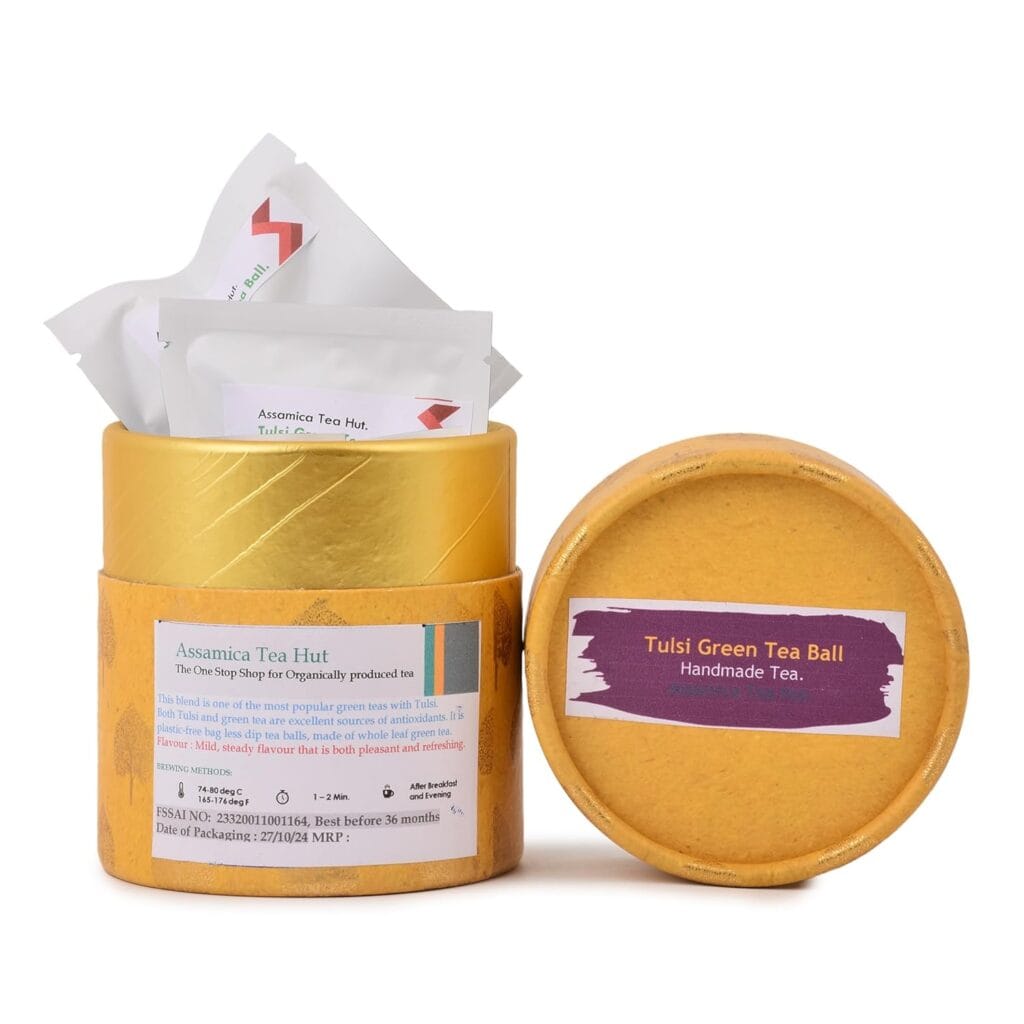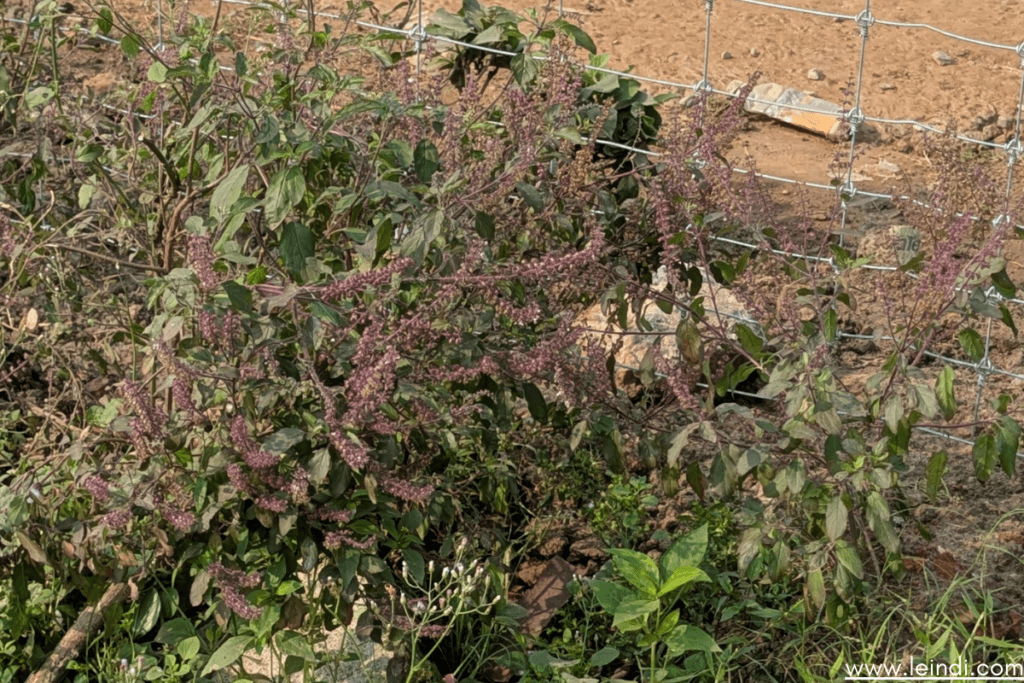Tulsi, also known as Holy Basil, holds a significant place in Ayurvedic medicine and Indian culture. This sacred plant is revered not only for its spiritual importance but also for its incredible medicinal properties. It is often called the “Queen of Herbs” for its unparalleled therapeutic potential. Native to the Indian subcontinent, tulsi has been utilized for centuries as a natural remedy to address various ailments and promote overall well-being. This article explores the benefits of tulsi as per Ayurveda, its health benefits, potential side effects, and the best ways to consume it and discuss why tulsi is called queen of herbs?
This post may contain affiliate links. If you make a purchase through these links, i may earn a small commission at no extra cost to you.
The Role of Tulsi in Ayurveda
Ayurveda, the ancient Indian system of medicine, views tulsi as a “rasayana” herb, meaning it is an adaptogen that helps the body resist stress and promote longevity. It is regarded as a “sattvic” plant, which means it enhances mental clarity, peace, and spiritual growth. It is believed to balance all three doshas—vata, pitta, and kapha—making it a versatile herb for maintaining overall health. Many parts of India, especially Odisha, consider this queen of herbs a sacred plant and offer it to Lord Jagannath.
In Ayurvedic texts, tulsi is associated with properties like being anti-inflammatory, antimicrobial, antioxidant, and detoxifying. It is classified into two primary varieties: Krishna Tulsi (dark-leaved) and Rama Tulsi (green-leaved), both offering similar benefits with slight variations in potency.

Assamica Tea Hut Tulsi Green Tea Balls (Pack of 10 balls) – Reusable Tea Infuser Balls, Organic Herbal Holy Basil InfusedTea Blend, Steep Up to 3 Times
Where to Find this Queen of Herbs
Tulsi, often referred to as the ‘queen of herbs,’ grows abundantly in tropical and subtropical regions, especially in India. It is widely cultivated in home gardens, temples, and farms. The plant thrives in well-drained soil with adequate sunlight. Known for its many health benefits, it is also available globally in various forms, such as dried leaves, powder, tea, oil, and capsules, through herbal stores and online platforms.
Health Benefits of Queen of Herbs
There are many points why tulsi is called queen of herbs; let’s discuss 10 most exciting ones.
1. Immune System Support Tulsi is known for its ability to strengthen the immune system. Its antimicrobial and antiviral properties help the body fight infections caused by bacteria, viruses, and fungi. Regular consumption of it’s leaf boosts the production of antibodies, enhancing the body’s defense mechanisms.
2. Respiratory Health It is highly effective in managing respiratory disorders. It helps alleviate conditions like asthma, bronchitis, cough, and cold. The herb’s expectorant properties help in clearing mucus from the respiratory tract, making breathing easier. It also acts as a natural remedy for sore throat.
3. Stress and Anxiety Relief As an adaptogenic herb, it helps the body cope with physical and mental stress. It reduces cortisol levels and promotes relaxation, making it an excellent remedy for anxiety, depression, and fatigue. Regular consumption of tulsi tea is known to improve mood and enhance mental clarity.
4. Cardiovascular Health Tulsi supports heart health by reducing cholesterol levels and regulating blood pressure. Its antioxidant properties protect the heart from oxidative stress and reduce the risk of heart diseases. It also helps improve blood circulation, ensuring the proper functioning of the cardiovascular system.
5. Anti-inflammatory and Pain Relief The anti-inflammatory compounds in tulsi help reduce inflammation in the body. It is effective in alleviating joint pain, arthritis, and other inflammatory conditions. It’s oil is often used topically to relieve pain and swelling.
6. Digestive Health Tulsi aids digestion by stimulating the production of digestive enzymes. It helps in relieving bloating, acidity, and indigestion. The plant’s antimicrobial properties ensure a healthy gut by preventing the growth of harmful bacteria.
7. Skin and Hair Benefits It’s antibacterial and antifungal properties make it a popular ingredient in skincare and haircare routines. It helps treat acne, pimples, and other skin infections. It’s leaf extracts are also used in shampoos and hair oils to combat dandruff, promote hair growth, and maintain scalp health.
8. Detoxification it acts as a natural detoxifier by flushing out toxins from the body. It purifies the blood and supports liver health, making it beneficial for individuals exposed to environmental pollutants and toxins.
9. Diabetes Management It helps regulate blood sugar levels by enhancing insulin sensitivity. Regular consumption of it’s leaves or tea can prevent sudden spikes in blood sugar, making it beneficial for individuals with type 2 diabetes.
10. Anticancer Properties Research suggests that tulsi contains phytochemicals that may have anticancer properties. These compounds help in preventing the growth of cancerous cells and protecting the body from the harmful effects of radiation and chemotherapy.

Tulsi Side Effects and Precautions
While tulsi, often referred to as the “queen of herbs,” is generally safe for consumption, it may have certain side effects in specific cases. Pregnant and breastfeeding women should consult a healthcare provider before consuming tulsi, as its effects during these stages are not well-documented. Additionally, tulsi may act as a natural blood thinner, so individuals on anticoagulant medications should use it with caution. People taking medications for diabetes should also monitor their blood sugar levels closely, as tulsi may enhance the effects of these drugs. Although rare, some individuals may experience allergic reactions to tulsi, with symptoms such as itching, swelling, or difficulty breathing. It’s important to be mindful of these potential side effects while enjoying the many benefits of this revered herb.
How to Consume Effectively
It’s leaves can be consumed in various forms, depending on personal preferences and health goals. Here are some common ways to incorporate it into your routine:
1. Fresh Leaves Chewing 2-3 fresh leaves daily on an empty stomach is a simple way to enjoy its benefits. It helps boost immunity and promotes overall health.
2. Tulsi Tea is a popular way to consume this herb. To prepare, boil a few fresh or dried leaves in water for 5-7 minutes. Add honey or lemon for flavor if desired. This tea helps relieve stress, improve digestion, and combat respiratory issues.
3. Tulsi Juice Extracting juice from fresh tulsi leaves is another effective way to consume it. Mixing it with honey or ginger enhances its medicinal properties, especially for respiratory and digestive health.
4. Tulsi Powder can be added to smoothies, soups, or herbal decoctions. It is a convenient option for individuals who do not have access to fresh leaves.
5. Tulsi Capsules and Supplements For those who prefer a more standardized dosage, it’s capsules and supplements are readily available in the market. Always consult a healthcare provider before starting any new supplement.
6. Tulsi Oil is used externally for massages, aromatherapy, and treating skin conditions. It should be diluted with a carrier oil before application.
Conclusion
Tulsi, the queen of herbs, the sacred plant of Ayurveda, offers a plethora of health benefits that cater to physical, mental, and spiritual well-being. Its adaptogenic, antimicrobial, and anti-inflammatory properties make it a versatile herb for addressing various health concerns. While it is generally safe for consumption, it is essential to be mindful of its potential side effects and consult a healthcare provider if necessary. Incorporating it into your daily routine, whether through tea, fresh leaves, or supplements, can be a simple yet effective way to enhance your overall health and vitality. With its profound medicinal properties and rich cultural significance, it truly deserves its title as the “Queen of Herbs.







